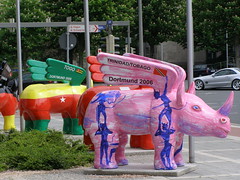Thursday May 4th
The Squid and the WhaleUSA/88mins/2005
Winner of two top Sundance prizes (the dramatic directing and Waldo Salt screenwriting awards) for filmmaker Noah Baumbach, "Squid's" accomplishment is especially remarkable because its material is so familiar. "Squid's" roots are in youthful autobiography, in a family's divorce and a son's coming of age, usually the elephant's graveyard of independent cinema.
The film's success against these obstacles demonstrates that if you are gifted enough — and if you have a superlative cast top-lined by Jeff Daniels and Laura Linney— your story can belong to everyone. Clear-eyed and intimate, a deeply felt narrative that flinches from nothing, "Squid" is a model of what independent filmmaking can achieve, even on a hectic 23-day shooting schedule and a $1.5-million budget.
With a title whose meaning and resonance become clear only at the close, "Squid's" great strength is that it is as perceptive as it is personal. It's the work of a skillful writer-director (this is Baumbach's third film, following 1995's wonderful "Kicking and Screaming" and 1998's "Mr. Jealousy") who has what might be called perfect emotional pitch.
"I try not to think of the movie conceptually, I start with characters and conversations I find interesting," Baumbach says of his process in the Newmarket Press edition of his screenplay. But it is Baumbach's sensitivity to nuances within those characters, his ability to capture the painful yet comic intricacies of troubled relationships, that brings to mind Tolstoy's epigram that "every unhappy family is unhappy in its own way."
Convincingly set in the Park Slope section of Brooklyn in 1986, "Squid's" particular family is introduced playing tennis. The sides that are chosen, father Bernard Berkman (Daniels) and 16-year-old Walt (Jesse Eisenberg) versus mother Joan Berkman (Linney) and 12-year-old Frank (Owen Kline), are the ones that will form off court as well.
In the ways casual sports contests have of revealing character, it's obvious before the match is over that the Berkman marriage is finishing. The pain of that dissolution will savage everyone's lives, destroying emotional moorings with indiscriminate ferocity.
Hit especially hard are the sons, who see their parents gradually change from comforting figures to seething adversaries, a switch that skewers their perceptions of the world and makes it especially difficult to hold on to a place in it.
The dominant member of the family is Bernard, a once-promising novelist turned college writing teacher. Spectacularly played by a full-bearded Daniels, Bernard is such an intense, complicated, frustrating figure it would take someone else's novel to do him complete justice. It is the gift of Daniels (who wears some of Baumbach's novelist father's clothes on-screen) to take on this impossible character on his own terms without condescension or special pleading.
The smartest and most self-absorbed man in any room, Bernard is filled with cocksure and prickly opinions about topics as varied as sports and literature. Someone who claims to have fired his agent because "he made a disparaging remark about the Knicks at a party," Daniels' Bernard lives so much in his head he has no idea what appropriate behavior is toward his family or the world. Coupled with his excellent cameo in "Good Night, and Good Luck," this is a performance that makes you wish there was even more of Daniels on contemporary screens.
In spite of, or perhaps because of, all this, Walt idolizes and idealizes his father, parroting his opinions and calling a story "Kafkaesque" even though he hasn't read it. A very earnest, very aware, very awkward boy, like his father in being more clueless than he realizes, Walt is beautifully played by Eisenberg, who held his own against Campbell Scott in "Roger Dodger." With a father like that as role model and advice giver, Walt's adolescence is headed for a bumpy landing.
Walt's more emotional younger brother, Frank, naturally sides with their mother, but that does not make his passage through this time any less torturous. Newcomer Kline (the son of Phoebe Cates and Kevin Kline) does a beautiful job handling the complexities of this increasingly troubled young man. (Baumbach's real-life younger brother Nico has a cameo as one of Bernard's former students.)
As mother Joan, Linney expertly handles a role that is more complex than it seems at first. A caring mother who calls her sons "chicken" and "pickle," Joan can't help coming off as more centered than her husband. But certain of her actions as well as her way, as she says to her son, of "saying things the way you don't want to hear them," makes her more of a problematic parent than we initially realize. Further complicating her situation is that though her husband's career is dormant, she is coming into her own as a writer.
Gradually, horrifyingly, somehow comically, these four people move into the slow-motion nightmare that is separation and divorce.
It's a maelstrom that draws other people, like the boys' hunky tennis instructor, Ivan, and Bernard's sexy student Lili (William Baldwin and Anna Paquin, both ideally cast) into the chaos. As with any storm, the question is, who will survive and at what price.
Shot in Super 16 millimeter by Robert Yeoman to give it what the director calls a lived-in look and filled with interesting music (Pink Floyd's "Hey You" is a key plot element), "The Squid and the Whale" never compromises its integrity. Baumbach said he chose Super 16 partly as a tribute to the directors he loved from the 1980s — the Coen brothers, Jim Jarmusch, Spike Lee. If this marvelous film is any Indication, he is ready to take his place in their company.



